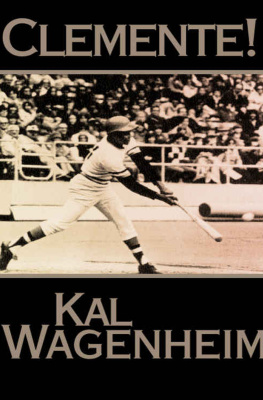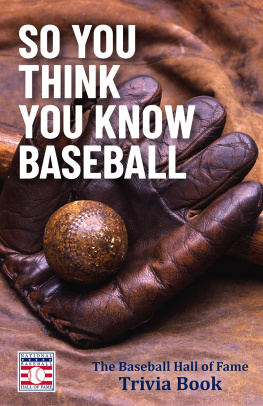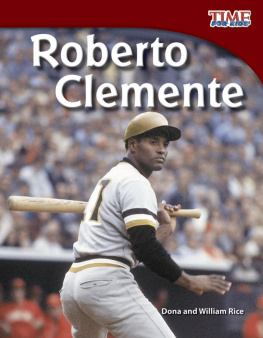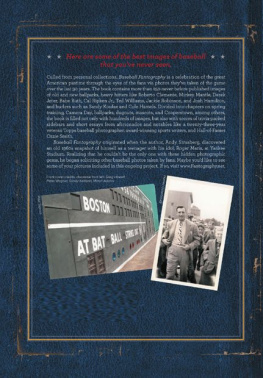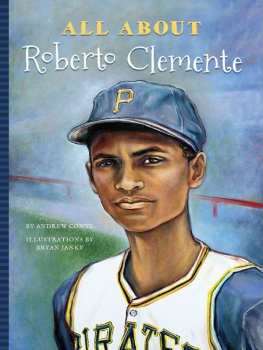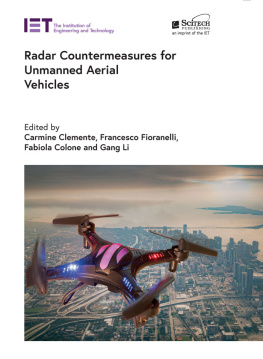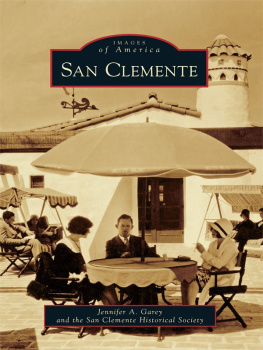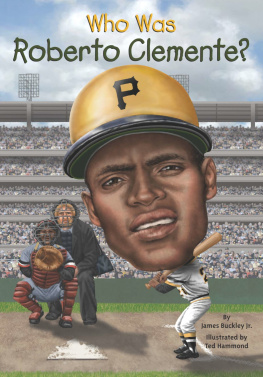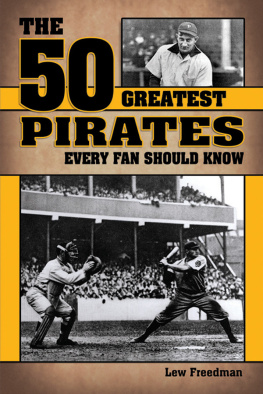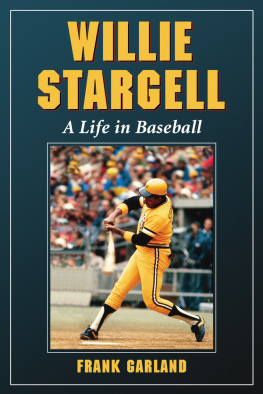Kal Wagenheim - Clemente!
Here you can read online Kal Wagenheim - Clemente! full text of the book (entire story) in english for free. Download pdf and epub, get meaning, cover and reviews about this ebook. year: 2014, publisher: Open Road Media, genre: Detective and thriller. Description of the work, (preface) as well as reviews are available. Best literature library LitArk.com created for fans of good reading and offers a wide selection of genres:
Romance novel
Science fiction
Adventure
Detective
Science
History
Home and family
Prose
Art
Politics
Computer
Non-fiction
Religion
Business
Children
Humor
Choose a favorite category and find really read worthwhile books. Enjoy immersion in the world of imagination, feel the emotions of the characters or learn something new for yourself, make an fascinating discovery.
- Book:Clemente!
- Author:
- Publisher:Open Road Media
- Genre:
- Year:2014
- Rating:3 / 5
- Favourites:Add to favourites
- Your mark:
- 60
- 1
- 2
- 3
- 4
- 5
Clemente!: summary, description and annotation
We offer to read an annotation, description, summary or preface (depends on what the author of the book "Clemente!" wrote himself). If you haven't found the necessary information about the book — write in the comments, we will try to find it.
Clemente! — read online for free the complete book (whole text) full work
Below is the text of the book, divided by pages. System saving the place of the last page read, allows you to conveniently read the book "Clemente!" online for free, without having to search again every time where you left off. Put a bookmark, and you can go to the page where you finished reading at any time.
Font size:
Interval:
Bookmark:
Kal Wagenheim

To doa Vera Cristina Zabala Vda. de Clemente
and doa Louisa Walker Vda. de Clemente
Foreword
By Wilfrid Sheed
If there is such a thing as a virtue of pride, Roberto Clemente had it. Pride for him was not an indulgence but a moral obligation. Standing at the plate, or strolling with regal slowness to right field, he seemed to say, You will pay attention. And as his throws came cracking into the third baseman's glove, with that strange extra venom he carried in his shoulder, they said, Could a white man do better? Could even a black American do better?"
Clemente was a black Puerto Rican, but he was too sensitively tuned to say, I'm doing this for Puerto Rico. Instead he would do it as the Others did itfor himself. I, personally, am better than you. What do you make of that? Now perhaps you can accept my people. If Ego is the game, we'll beat you at that too. Standing still as a statue in the October shadows, he looked, grotesquely, more like a patriot than anything usually seen on a ball field.
A trick of the light perhaps. Yet what famous athlete last died for a cause bigger than himself? Clemente could sometimes seem like a pest, a nagging narcissist, with only his burningly serious play to deny it. Yet when that plane crashed carrying relief supplies to Nicaragua we saw what he had meant all along. It was like the old Clemente crashing into the right field wall in a losing game: the act of a totally serious man.
By chance I met Clemente once, in the humble role of autograph-seeker. He was doing wind sprints down at the Pirate training camp in Bradenton, Florida. And although I claimed I was getting the autograph for my son (true, for a change), he looked at me with a hidalgo's contemptat a grown man simpering over a blunt pencil; he turned his back abruptly and did another wind sprint, then slashed his name onto my scorecard and sauntered away. To hell with you, Clemente, I thought. But on the way out, I saw him funning with three old ladies from Allentown, Pennsylvania, and I have never seen sweeter courtesy.
Arrogance and gentleness. Where did it come from? Clemente was like a Martian to most North Americans, and has been written about as such. But not by Kal Wagenheim. By another chance, I met Kal in Puerto Rico in 1969, and on the strength of a passing recommendation by a mutual friend (if Dickens can use that phrase wrong, so can I) he dropped everything else and spent a week showing us round San Juan. The first day out, we got caught in one of those creative traffic snarls Puerto Ricans can apparently cook up even faster than Romans. Wagenheim was bumped and wearily got out to do battle. But the woman in the offending car turned out to be the mother of his cleaning lady, and before we knew it they were exchanging gossip and embracing hotly, like long-lost relativesor like Clemente and his fans from Allentown.
In other words, Kal knows his Puerto Rico, not as a scholar but as a lover who chose to live and marry there, and even to identify with the independence movement. For a while he ran a fine literary-cum-political magazine in San Juan, and I imagine he would still give his right typing finger to see one local writer properly recognized on the mainland.
Fortunately, he also knows his baseball. As a boy first baseman, he got closer to the big leagues than most of us dreamers ever do, as far as an offer to play in the high minors in fact, until, at Fort Benning, he found himself staring curiously at a jet-stream fastball and decided (on the spot) that there must be better uses for his head than sticking it in the way of those things.
As it turns out, he also had a rendezvous with a subject, Roberto Clemente and Puerto Rico. This isn't just a baseball book, but a social history or meditation on an island, bitched by history and responding to it, like the Irish and other oppressed people, with public pride and private warmth: this culture, then, as personified in one man. And Wagenheim also knows what it means to be proud in the face of a big league fastball. Puerto Rico fights no wars of its own and must look elsewhere for its distinctive heroes. In the quaint American game, with the ball and the stick and the diamond setting, it found itself an authentic one.
Acknowledgments
I wish to thank all the persons quoted in this book who kindly took the time to grant me an interview, and alsofor their help in different aspects of the projectWilliam J. Guilfoile, director of public relations for the Pittsburgh Pirates; Lon King, my editor at Praeger Publishers; and William Wagenheim, Harold Wagenheim, David Straus, Ronald Walker, Rai Garcia, Robert Jacobson, Neal Herschfeld, Jos Manuel Alvarez, and Ernest Potvin.
About Roberto Clemente Walker
Born August 18, 1934, in Carolina, Puerto Rico.
Died December 31, 1972, in a plane crash a few miles from his birthplace, while on a mission of mercy to aid the earthquake victims in Nicaragua.
Beloved son of Melchor Clemente and Luisa Walker de Clemente; husband of Vera Cristina Zabala de Clemente; father of Roberto, Jr., 8, Luis Roberto, 7, and Enrique Roberto, 4.
First Latin American to enter Baseball's Hall of Fame, August 6, 1973.
Eleventh man in the 103-year history of major league baseball to achieve 3,000 hits, a mark reached in his last year, 1972.
Most Valuable Player, National League, 1966.
Batting champion, National League, 1961, 1964, 1965, 1967.
Winner of the Golden Glove for fielding excellence, twelve seasons, 1961-72.
Batted above .300 for thirteen seasons, averaging .317 during his eighteen-year big league career.
Played in twelve Major League All-Star Games, 1960-72.
Won the Babe Ruth Award for his superb play in the 1971 World Series; tied world record by hitting safely in all fourteen games of the 1960 and 1971 Series.
All-time leader of the Pittsburgh Pirates in games played, at bats, hits, singles, total bases, and runs batted in.
Tied major league record by leading National League in assists for five seasons.
Holds National League record with ten base hits in two consecutive games, August 22-23, 1970.
Tied National League record by hitting three triples in one game, September 8, 1958.
Introduction
In a treatise about his own breed, Paul Gallico once said that sports writers are often cynics because they learn eventually that, while there are no villains, there are no heroes either. But, he warned, until you make the final discovery that there are only human beings, who are therefore all the more fascinating, you are liable to miss something."
Roberto Clemente Walker* of Puerto Ricothe first Latin American to enter baseball's Hall of Famewas a fascinating human being. And if, as Gallico observes, there are no heroes, there are men who achieve deeds of heroic dimension. Roberto Clemente was one of these gifted few.
[*In the United States, Walker was incorrectly used as Roberto's middle name. It was actually his second surname. Hispanic people use the surnames of both parents, with Clemente, the father's, being dominant, followed by Walker, his mother's maiden name.]
"Without question the hardest single thing to do in sport is to hit a baseball, says the great Boston slugger Ted Williams. A .300 hitter, that rarest of breeds, goes through life with the certainty that he will fail at his job seven out of ten times. A baseball is a sphere with a diameter of 2 1/2 inches. The batter stands at home plate and grips a tapering wood cylinder that has a maximum diameter of 2? inches; he tries to defend a strike zone that is approximately seven baseballs wide and eleven high. The pitcher, from 60? feet away, throws the ball at a speed of about 90 miles per hour. As it spins toward the platehopping, sinking, or curvingthe hitter has four-tenths of one second to decide whether he should let it pass by, jump away to avoid being maimed, or swing. To get good wood on it, he must connect squarely with a 1/2-inch portion of the ball's round surfaceand then hope that none of the nine defensive players catches it. Roberto Clemente had enormous success in this complex, difficult task. In September, 1972, when he smashed his 3,000th hit, he scaled a peak where only ten other men in the hundred-year history of baseball ever set foot. In his eighteen years as a major league player, he made a memorable impact upon a great sport. A lifetime average of .317, four league batting championships, a Most Valuable Player award, and twelve Golden Gloves for superior defensive play are just a few souvenirs that attest to his marvelous talent. During the 1971 World Series, his devastating tour de force, witnessed by millions on television, at last evoked the national recognition that he felt was long overdue. Roger Angell, in his superb book The Summer Game, says, Now and againvery rarelywe see a man who seems to have met all the demands, challenged all the implacable averages, spurned the mere luck. He has defied baseball, even altered it, and for a time at least the game is truly his. During that 1971 World Series, and on many other occasions, the game was Roberto Clemente's.
Font size:
Interval:
Bookmark:
Similar books «Clemente!»
Look at similar books to Clemente!. We have selected literature similar in name and meaning in the hope of providing readers with more options to find new, interesting, not yet read works.
Discussion, reviews of the book Clemente! and just readers' own opinions. Leave your comments, write what you think about the work, its meaning or the main characters. Specify what exactly you liked and what you didn't like, and why you think so.

